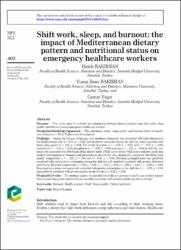| dc.contributor.author | Bakırhan, Hande | |
| dc.contributor.author | Bakırhan, Yunus Emre | |
| dc.contributor.author | Yaşar, Gamze | |
| dc.date.accessioned | 2023-09-18T12:33:03Z | |
| dc.date.available | 2023-09-18T12:33:03Z | |
| dc.date.issued | 2023 | en_US |
| dc.identifier.citation | Bakırhan, H., Bakırhan, Y. E. ve Yaşar, G. (2023). Shift work, sleep, and burnout: the impact of Mediterranean dietary pattern and nutritional status on emergency healthcare workers. Nutrition and Food Science, 53(2), 402-415. https://dx.doi.org/10.1108/NFS-02-2022-0037 | en_US |
| dc.identifier.issn | 0034-6659 | |
| dc.identifier.issn | 1758-6917 | |
| dc.identifier.uri | https://dx.doi.org/10.1108/NFS-02-2022-0037 | |
| dc.identifier.uri | https://hdl.handle.net/20.500.12511/11450 | |
| dc.description.abstract | Purpose This study aims to evaluate the relationship between dietary patterns and shift work, sleep quality and burnout among emergency health-care workers. Design/methodology/approach The nutritional status, sleep quality and burnout status of health-care workers (n = 91) in Turkey were investigated. Findings Among the burnout subgroups, only emotional exhaustion was associated with high adherence to the Meditarrenean diet. (r = 0.37, p < 0.01). Carbohydrates consumed during the shift day were associated with lower sleep quality (r = 0.24, p = 0.02). The intake of protein (r = -0.29, p < 0.01), fat (r = -0.27, p < 0.00), cholesterol (r = -0.31, p < 0.01), phosphorus (r = -0.22, p = 0.03) and iron (r = -0.21, p = 0.04) in shift day was negatively associated with Pittsburgh Sleep Quality Index (PSQI) scores (lower PSQI scores indicates good sleep quality). Consumption of vitamin C and potassium on the rest day was significantly associated with better sleep quality (respectively, r = -0.21, p = 0.04 and r=-0.23, p = 0.03). Personal accomplishment was positively correlated with carbohydrate consumption during the shift day and negatively correlated with protein, cholesterol and vitamin B6 intake (respectively, r = 0.22, p = 0.03; r = -0.21, p = 0.03; r=-0.28, p < 0.00, r = -0.28, p < 0.00). Emotional exhaustion was negatively correlated with protein consumption on the shift day (r = -0.21, p = 0.04) and positively correlated with fat consumption on the rest day (r = 0.22, p = 0.02). Originality/value The findings confirm the possible role of dietary patterns in health-care workers against burnout and sleep quality attributable to a possible association with nutrients intake on shift or rest day. | en_US |
| dc.language.iso | eng | en_US |
| dc.publisher | Emerald Publishing | en_US |
| dc.rights | info:eu-repo/semantics/embargoedAccess | en_US |
| dc.subject | Burnout | en_US |
| dc.subject | Health Workers | en_US |
| dc.subject | Shift | en_US |
| dc.subject | Sleep Quality | en_US |
| dc.subject | Dietary Patterns | en_US |
| dc.title | Shift work, sleep, and burnout: the impact of Mediterranean dietary pattern and nutritional status on emergency healthcare workers | en_US |
| dc.type | article | en_US |
| dc.relation.ispartof | Nutrition and Food Science | en_US |
| dc.department | İstanbul Medipol Üniversitesi, Sağlık Bilimleri Fakültesi, Beslenme ve Diyetetik Bölümü | en_US |
| dc.authorid | 0000-0001-9377-888X | en_US |
| dc.identifier.volume | 53 | en_US |
| dc.identifier.issue | 2 | en_US |
| dc.identifier.startpage | 402 | en_US |
| dc.identifier.endpage | 415 | en_US |
| dc.relation.publicationcategory | Makale - Uluslararası Hakemli Dergi - Kurum Öğretim Elemanı | en_US |
| dc.identifier.doi | 10.1108/NFS-02-2022-0037 | en_US |
| dc.institutionauthor | Bakırhan, Hande | |
| dc.institutionauthor | Yaşar, Gamze | |
| dc.identifier.wos | 000804830400001 | en_US |
| dc.identifier.scopus | 2-s2.0-85131445702 | en_US |
| dc.identifier.scopusquality | Q3 | en_US |


















